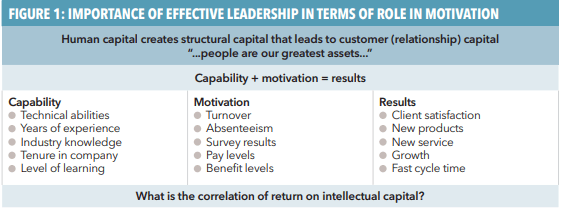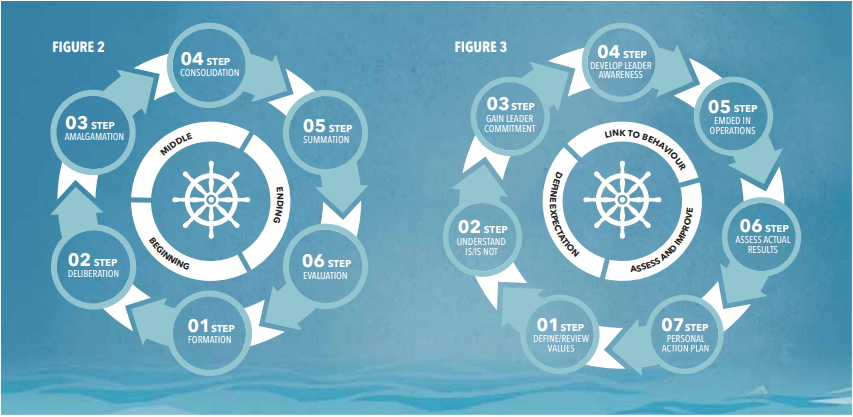Nick Shepherd explains how effective leadership creates significant benefits for both the individual and the organisation they work for.
While communication skills have been identified as a core competency in almost every leadership role, including the training and development of professional accountants, many approaches to developing these skills fail to consider the impact of personality. Poor leaders typically know the textbook approaches to effective communication but fail miserably in execution, often resulting in poor motivation and a reluctance to contribute.
The importance of effective leadership in terms of its role in motivation was identified in the IMA publication 'Unrecognized Intangible Assets: Identification, Management and Reporting' using Figure 1.
This chart remains relevant as organisations try to communicate their performance on managing talent to the market place. However, while metrics such as diversity, absenteeism and training hours are often used to measure performance, they fail to clearly demonstrate the effectiveness of talent management.
It’s not how many qualified staff you have or absenteeism that matters, it’s demonstrating the effectiveness with which the organisation is using its resources. This determines motivation and only motivated employees will deliver the optimum results. That is the job of the leader, so an understanding of leadership effectiveness should be central.
Figure 1: Importance of effective leadership in terms of role in motivation

The steps of a reflective leader
- Define organisational values, as these establish the base for the behavioural culture
- Discuss how these values can be converted into specific operational behaviours.
- Educate, support and coach leaders, to ensure they believe in the culture
- Help leaders develop self-awareness through tools such as emotional intelligence and determination of behavioural traits
- Establish foundation for consistency of action to ensure the core business processes reflect the values and culture being demonstrated by the leader.
- Implement effective 360° assessment, feedback and coaching
- Support leaders in learning from the feedback they receive and in developing their skills.
Poor leaders typically know the textbook approaches to effective communication, but fail miserably in execution
Improving efficiency
First, how does my own personal style and behaviour impact on the messages that I am trying to communicate to others? Note that it is others and not just staff; for advisory professions such as finance, where senior financial managers often have no direct line responsibility, their key value is in being respected and listened to by others.
Successful managers achieve results through their influence on the decision-making and action of others. Effective leaders can positively affect all relationships – with staff, peers, subordinates, external contractors, regulators, advisers, suppliers, customers and others. Building positive relationships is critical for these leaders in adding value within their organisation.
Second, how is my message being heard differently by others? As an example, a leader who is more comfortable in group situations and has a level of extroversion may embrace teamwork and assume that, given the opportunity, others will also speak up and provide their opinion. However, there are people who are less comfortable in these situations and will require the leader to ask them their opinions directly and encourage their contribution. If this does not happen, they will listen but probably remain quiet, keeping their ideas to themselves. This can result in some participants not contributing their best and even disagreeing with decisions made, so leaving the session demotivated.
Third, the reflective leader always asks ‘why?’ Leaders should constantly question the way that activities and processes work within their organisation. Not necessarily in a desire of change for change’s sake, but in keeping an open mind that there may be a better way. In a rapidly changing work environment, what worked yesterday might not work today.
Traditional approaches to learning desired competencies are taught through developing issue awareness rather than behavioural awareness
Making the dream work
This investment can fail if people feel that their personality or perspective is not understood and incorporated into team development, and the underlying negative opinions they have about each other remain in place. So it’s important to go beyond the surface and deal with any incorrect beliefs about the motivations of others in order to build trust.
Effective teams are the sum of their parts – they work because of a combination of personalities and skills. If a single member of the team changesthe dynamic of the whole team will need to reframe its reality. This is why teams tend to become less effective as members leave. Team building is not a linear process and the traditional four-step model of “forming, storming, norming and performing” cannot build sustainable teams.
Team development must be a continuing process through which effective interaction between key individuals is sustained and tested in operational reality. This will help sustain the dynamic of the team and its efficiency when individual members change, as illustrated in Figure 2. Instead of the traditional four-step linear process, the improved approach is a six-step continual process.
Figures 2 and 3

The strategy of soft skills
Corporate culture and leadership are closely intertwined. Failure to deliver on a desired corporate culture is often caused by a gap between what we say and what we do. Ensuring that leaders deliver on their promises is what gives statements of intent such as corporate values or codes of conduct meaning. Developing effective leaders must start with commitment to a shared purpose and way of behaving. The process of leadership development is outlined in Figure 3.
Continuous development
There is no cookie cutter approach to leadership development because leadership is, ultimately, a situational skill impacted by several factors. These include the leader’s own personality, the task at hand, the culture of the organisation and the personalities of team members.
The effectiveness of the team determines the effectiveness of the tasks being performed. A reflective leader constantly assesses their own behaviour, as well as the effectiveness of their organisation and their efforts to complete the tasks required. Through this, they can develop the basis for continuous improvements and lay the groundwork for a constantly learning organisation.
Corporate culture is the crucible within which all corporate and collective activity takes place; individuals who are reflective in their leadership approach will provide a key strategic advantage and build a sustainable business model. Too often organisations focus on developing improved approaches to tasks rather than the capability of those who enable people to achieve the desired outcomes. This is a key invisible asset that forms the intangible value or goodwill that exists in high-performing organisations.
About the author
Nick Shepherd is the author of 'Reflective Leaders and High-Performance Organizations'
Download PDF article
More support on business
Read our articles, eBooks, reports and guides on leadership.
Leadership hubeBooks on human resourcesCan't find what you're looking for?
The ICAEW Library can give you the right information from trustworthy, professional sources that aren't freely available online. Contact us for expert help with your enquiries and research.
